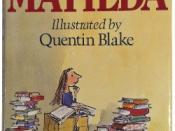�PAGE � �PAGE �6�
� �
�
�
�
�
�
- �
�
Name: KOYEL BHATTACHARYYA
Roll No.: 46
Class: UG 1
�
The topic that is being dealt with here has been treated in uniformly the same way in the book as in its adaptation as a film. The novel Matilda written by Roald Dahl was published in the year 1988. It was made into an adaptation as a film by director Danny DeVito in 1996 and released by Tri-Star Pictures. The book was primarily aimed at a young audience but it is Danny DeVito's excellent direction and Mara Wilson's (playing the role of Matilda) extraordinary acting that has brought out the complex issues present underneath the apparently simple story. Besides, the film being an interactive medium of entertainment that has an audio-visual effect on its audience, is able to render a realistic effect to every incident.
Matilda is the story of a five year old child genius whose parents are practically oblivious to her existence. But it is her self-reliance that does not allow her to become a helpless victim of her parent's repeated attempts to deny her a sense of self-worth.
She is once again ignored; her genius is not acknowledged and promoted by her principal Miss Trunchbull when she begins school. Almost every child of the school including Matilda, and even her lovable teacher Miss Honey become hapless victims of her tyranny. But soon, not being able to bear with such unjust treatment, Matilda develops some sort of miraculous powers by virtue of her intelligence at such a young age. She effectively takes the help of her powers and her self-reliance to assert her individuality and to make everyone aware of her existence. Thus ends the 'strife of an independent spirit like Matilda' and she emerges victorious, triumphing over every harrowing hassle in her life.
"You, my old friendsâ¦
â¦Go in peace. For you could not reside here:
Remote here in the worlds of ice and stone."
-Friedrich Nietzsche in Beyond Good and Evil
Matilda is naked and alone in the snow. She has been born into a frozen world. It is not that she is born during the winter or she is born at the poles. And neither is the adjective used metaphorically: it is not that the world into which she is born is motionless; it is not that this world is emotionally cold and barren; not that her world is a frozen version of the world of ours. Quite simply, Matilda does not belong to this world. She is far removed; she cannot understand this world.
Right from her birth Matilda has to support herself. Her parents rarely acknowledge her existence. They treat her as a scab. At a very young age she learns to fend and educate herself. Though, she shows strong signs of being a genius, her parents encourage her to watch television instead of reading books. Matilda however proves to be very independent for her age and manages to keep her head up and not let her parents put her down.
Instead of appreciating Matilda, her parents repeatedly try to cow her down. By the time she is one and a half years old, she has a perfect speech. But instead of being applauded, she is taunted as a 'noisy-chatterbox'.
By the time she is three, she has already taught herself to read by studying the newspapers, magazines and every other book present in the house. Gradually, her love for books and reading develops and she starts hankering after for more books to read. But when asked for help, Mr.Wormwood, like a very irresponsible father, turns her down. Still, Matilda does not get demoralized. Moreover her determination gets all the more tougher; she herself finds her way to the village library and amasses a great deal of knowledge from books like Oliver Twist by Charles Dickens, Jane Eyre by Charlotte Bronte, etc. Even when she brings books home the idea does not sit well with the Wormwoods. However she does not care about them and soon she finishes reading all the books in the library.
Matilda's family is the kind of family that no one would ever wish for. Her parents, Mr. and Mrs. Wormwood are both conceited and concerned about only themselves. Mr.Wormwood runs a car dealing business in which he deceives people by selling them old cars counterfeited as new ones. Matilda, in spite of being such a little girl, constantly tries to make her father realize that it is cheating but she always gets ignored as 'a little twit'. Mr.Wormwood instead of giving moral lessons to his daughter, is given moral lessons by Matilda. Matilda's mother is also least bothered about her daughter and remains totally engrossed in making herself look beautiful and in playing bingo with her friends.
Matilda, thus is never either cared for or given any importance in her family. She resents being told constantly that she is ignorant and stupid because she knows she is not. All this reminds her of her father's saying, "Every person should be punished for what they do" and she realizes that even she can punish her parents. She makes her mind "every time her father or mother was beastly to her, she would get her own back in some way or another. A small victory or two would help her to tolerate their idiocies and would stop her from going crazy." It is not easy for somebody as small as her to score points against an all powerful grown-up but still she devises clever pranks to teach her parents lessons such as "the hat and the super glue", "the parrot in the chimney affair", and "the great hair oil switch." And every time Matilda's parents fall a prey to her pranks- thanks to her strong determination and intelligence.
One possible reason for why Matilda is not taken seriously by her parents may be that she is a girl. Because in the book Matilda's father, after she has done an extremely large calculation mentally, is found saying "No one in the world could give the right answer just like that, 'especially a girl'". But Matilda ultimately proves them wrong by her perseverance towards pursuing her aim i.e., to be educated.
Matilda's insatiable appetite for books and reading makes her all the more anxious to go to school. But her parents, not being interested about their daughter's education had forgotten to make any prior arrangements, compelling her to enter school as late as at the age of five and a half years.
However, Matilda's parents, according to the film adaptation, permits her to go to school only after her crooked salesman father sells a car to Miss Trunchbull, the Headmistress of Crunchem Hall and is very impressed by her war-like approach to school. Matilda's insensible parents thus admit her to this school which is run by the worst principal in the world without realizing the fact that their actions may prove to be detrimental to the development of their daughter.
The school is controlled by the iron fists of Miss Trunchbull who is a cruel authoritarian loathing children. Crunchem Hall, where the principal is infamous for her strict discipline and her habits of throwing children to practice hammer throwing, also features such delights as the 'chokey', which is a dark box-sized room with pieces of glass and nails sticking out of every surface where students are often locked in.
Matilda's extreme dedication and irresistible desire to learn soon comes to the fore after she starts attending the classes at Crunchem Hall. There she meets Miss Honey who is a very good, friendly and an extremely lovable teacher- a total opposite of Miss Trunchbull. On the very first day Miss Honey finds out the genius in Matilda. She comes to know that Matilda can spell difficult words and is brilliant in arithmetic. She is quite awestruck at first to see this wonder child. Soon after exploring her intelligence Miss Honey assumes that Matilda's parents must have taken great pains to have taught her all these at such a young age but is shocked to learn that not her parents but Matilda has taught herself from the very beginning. That Matilda's strong determination is responsible for her extraordinary feat at such a young age is reflected in her saying to Miss Honey, "I've always said to myself that if a pocket calculator can do it (big calculations) why shouldn't I?.....I think it's (the human mind) a lot better than a lump of metalâ¦That's all a calculator is."
But Matilda's genius is once again not acknowledged by Miss Truncbull. After she is told about Matilda's genius by Miss Honey she does not show any interest and refuses to promote her to a higher standard.
Meanwhile, the film adaptation exhibits the first show of her 'powers'. One day when she is forced to sit in front of the TV and watch television instead of reading books, her anger bursts out through her eyes dedicated at the TV and the TV explodes. Matilda herself does not realize how she is able to do it but it gives her immense satisfaction. This power of hers may seem to a normal human being to be some kind of a supernatural telekinetic power but it may be nothing but an outward manifestation of an unimaginable will power that Matilda possesses; she is able to channel her brain power to manipulate objects.
Matilda's rage constantly grows against Miss Trunchbull and she becomes more firm in her determination to teach her a lesson as the days pass by. Ever other day she sees one or the other child being tortured by Trunchbull- be it Amanda Thripp being hurled over the fence by her pigtails or Bruce Bogtrotter being given a giant chocolate cake to eat. Miss Trunchbull's behaviour almost sidelines child abuse and Matilda resolves to punish her and help her friends from becoming victims of her whims.
Matilda's firmness and strong leadership qualities is exhibited in the film when she leads the others in cheering up and motivating Bruce to finish the cake so that Miss Trunchbull can be defeated
In the mean time Matilda herself becomes one of her targets after the car that was sold to her by Mr.Wormwood begins to play up and Matilda being blamed for it has to get locked inside the chokey. All this aggravates her ire all the more.
Very soon the second show of her 'powers' is exhibited in the newt episode through which her enormous will power is all the more reflected. Matilda, being wrongly accused of putting the newt in the water jug by Miss Trunchbull, becomes unable to withstand the injustice and her resoluteness makes her manipulate the glass with the newt inside to trip over, the newt getting into Miss Trunchbull's smock and she fainting. After this act "A strange feeling of serenity and confidence was sweeping over her and all of a sudden she found that she was frightened by nobody in the world."
It is only after this episode that Matilda confides in Miss Honey about her 'powers' who at first does not believe it but after seeing another live demonstration of her ability gets flabbergasted.
That it is Matilda's strong resolution and determination that has made her develop this kind of 'miraculous powers' is first realized by Miss Honey. While walking towards her home with Matilda, she tells the child, lacking conceit and self-consciousness, that a reasonable explanation for her 'powers' may be her being 'quite exceptionally precocious'.
The reasonable, mature and grown up attitude of a developed personality like Matilda is reflected through her taking charge of all of Miss Honey's problems and a determination to wipe out the primary source of such misery- Miss Trunchbull.
In order to fulfill her vow to end all of Miss Honey's troubles, Matilda engages herself in exercising her skills and ultimately becomes successful in scaring away Miss Trunchbull by willing the chalk to write upon the blackboard, what is supposedly a message for the tyrant on behalf of Miss Honey's dead father Magnus, ordering her to return everything to Miss Honey.
The director Danny DeVito has added an extra episode at the end through which it is clearly reflected that no trouble can perplex Matilda, she continues in her path for fulfilling her aim relying completely on herself. After the Trunchbull is scared by the writing on the board, Matilda and Miss Honey under protest against the torture meted out to Miss Honey, sneaks into Trunchbull's house in search of Miss Honey's treasures trapped inside but are interrupted by the sudden return of Miss Trunchbull. Realising that someone has intruded into her house she goes on chase after them. Fortunately, once again Matilda's sheer intelligence comes into play and they manage to escape. In the process Matilda does a little haunting of her, making her believe the presence of a ghost in the house that ultimately drives her away from home. This episode has been magnificently developed by DeVito as a grim version of the children's game 'hide and seek', making it all the more interesting and exciting.
It is clearly evident that Matilda refuses to abide by the conventions. She always bears in herself this strong urge to be different. Matilda always has a revolutionary attitude towards conventions and stereotypes. In the film adaptation, at the very beginning, Matilda's red hair ribbon is clearly identified as being associated with her and it is very well known that 'red' is the colour of rebellion. She is extremely self-reliant and knows how to find her own way out. Even under the intimidating influence of her parents, she does not deviate from her path. In the book, Mrs.Wormwood is found telling Ms.Honey, "A girl should think about making herself look attractive so she can get a good husband later on. Looks is more important than books." But Matilda thinks exactly the way round. Mrs.Wormwood's saying clearly hints at a patriarchal society where girls only aimed at getting good husbands. But Matilda dares to be different. She is a girl who has been born with a modern outlook towards life and never can she be intimidated by authoritarian figures. No matter how much she is ignored and uncared for, she knows just what to do to make herself noticeable and to assert her individuality.
Thus emerges victorious over every hassle in her path, 'an independent spirit' named Matilda.
FOOTNOTES
Roald Dahl, Matilda ( New York: Puffin Books, 1988)
http://www.roalddahl.com/ 3 March 2008
http://www.kirjasto.sci.fi/rdahl.htm/ 27 March 2008
Sharon Royer, "Roald Dahl",26(1)
http://scholar.lib.vt.edu/ejournals/ALAN/fall98/royer.html/ 4 April 2008
http://us.imdb.com/ 4 April 2008
http://www.marawilson.com/ 4 April 2008
http://www.spe.sony.com/ 4 April 2008
10)http://www.blockbuster.com/ 4 April 2008
11)http://www.sonypictures.com/ 6 April 2008
12) http://www.nytimes.com/ 6 April 2008


